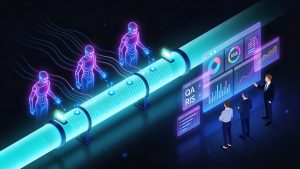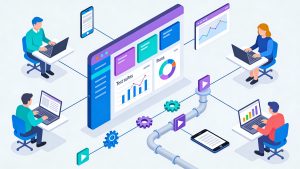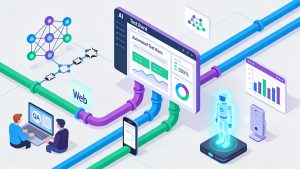In a bold move that underscores its commitment to advancing artificial intelligence technologies, Microsoft has announced the integration of DeepSeek’s R1 reasoning AI model into its Azure AI Foundry platform. This decision comes at a time when DeepSeek faces scrutiny over potential intellectual property infringement allegations from OpenAI, a close Microsoft partner. Despite these ongoing investigations, Microsoft’s decision to proceed with the integration highlights the company’s confidence in the potential of DeepSeek’s AI technology.
Azure AI Foundry: A New Home for R1
The Azure AI Foundry platform serves as a centralized hub for various AI tools tailored for business applications. Microsoft has ensured that the R1 model has undergone rigorous safety checks and security reviews to meet the company’s stringent standards before its integration. This meticulous vetting process demonstrates Microsoft’s commitment to maintaining the integrity and reliability of its AI offerings.
Expanding to Copilot+ PCs
Microsoft’s vision for R1 extends beyond cloud-based applications. The tech giant has unveiled plans to develop streamlined versions of the R1 model that can operate directly on its Copilot+ PCs. These specialized computers are designed to handle AI tasks efficiently, offering customers the flexibility to run AI models locally on their devices. This move towards edge computing in AI applications could potentially revolutionize how businesses interact with and utilize AI technologies.
Navigating Challenges and Concerns
While Microsoft forges ahead with the integration of R1, the company is not turning a blind eye to the controversies surrounding DeepSeek. An ongoing investigation is underway to determine whether DeepSeek improperly used OpenAI’s data in the development of its models. This scrutiny highlights the complex landscape of AI development and the importance of intellectual property rights in the rapidly evolving field.
Accuracy and Reliability Issues
Initial tests of the R1 model have revealed some concerning results. The model has demonstrated a tendency to provide inaccurate or incomplete responses, particularly when dealing with news-related queries. This inconsistency in performance raises questions about the model’s reliability and its readiness for widespread adoption.
Potential Censorship Concerns
Another notable observation from the R1 model’s performance is its apparent reluctance to address questions related to China. This behavior has sparked speculation about possible government censorship influencing the model’s responses. Such limitations could potentially impact the model’s global applicability and raise ethical concerns about AI development and deployment.
Microsoft’s Path Forward
Despite these challenges, Microsoft remains committed to leveraging the potential of the R1 model. The company is actively addressing the accuracy and reliability issues while continuing to investigate the allegations of data misuse. This balanced approach demonstrates Microsoft’s dedication to innovation while maintaining ethical standards in AI development.
Conclusion
Microsoft’s integration of DeepSeek’s R1 AI model into its Azure AI Foundry platform and future Copilot+ PCs represents a significant step in the company’s AI strategy. While the move is not without controversy, it showcases Microsoft’s willingness to explore cutting-edge AI technologies and its commitment to addressing challenges head-on. As the AI landscape continues to evolve, the tech industry will be watching closely to see how Microsoft navigates these complex waters and shapes the future of AI integration in business applications.



